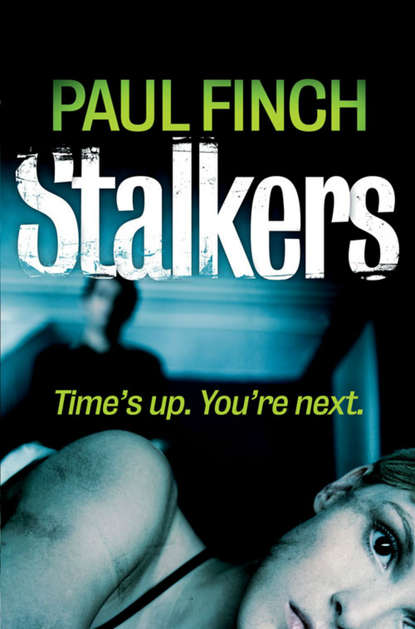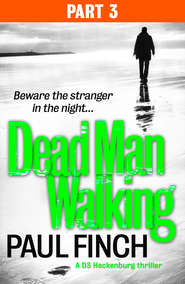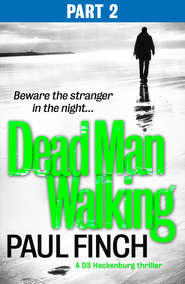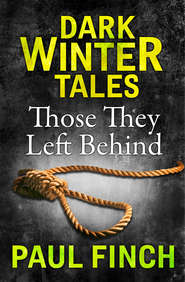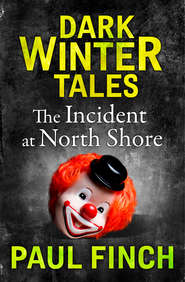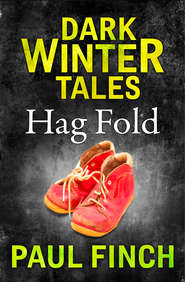По всем вопросам обращайтесь на: info@litportal.ru
(©) 2003-2025.
✖
Stalkers
Автор
Год написания книги
2019
Настройки чтения
Размер шрифта
Высота строк
Поля
He was in the front passenger seat, having clearly climbed in while she’d been distracted by the stinger. He was of heavy build and wore dark clothing: a bulky leather jacket and underneath that a ‘hoodie’ top with the hood actually pulled back. His hair was thinning and he had a pair of huge, jug-handle ears. But he had no nose – just a gristle-filled cavity – and no eyelids, while the rest of his face was a patchwork of puffy, raddled scar tissue.
Louise tried to scream, but a thick hand in a leather glove slapped onto her mouth. A second hand, also gloved, fastened around her throat.
And began to squeeze.
Chapter 2 (#ulink_4c27954b-b2a4-567b-9979-48ac5ae6f85a)
It was typical Bermondsey – scrap yards, wasteland, litter, graffiti running over everything.
Heck drove through it with a jaundiced eye, thinking only that his battered old Fiat Brava matched this decayed environment perfectly. To his left somewhere lay the river, delineated by the occasional crane or wharf-tower. He passed a row of boarded-up buildings on his right. A bag-lady sat on the kerb, her knees spread indecently wide as she drank from a bottle of cheap wine. Directly ahead, derelict tower blocks – bleak edifices of stained concrete and broken glass – were framed on the slate-grey sky.
He drove on, too weary to be oppressed by such a scene.
The appointed meeting-place turned out to be a crossroads close to a low railway arch. Corrugated steel fences hemmed it in from all sides and there was a single streetlight, its bulb long smashed. On the left, a mound of flattened brick rubble provided sufficient room for parking. However, Heck cruised on past, surveying the place carefully. There was nobody there, which, checking his watch – it was now ten minutes to six – was not surprising. He was early for the rendezvous, but at this hour on a Sunday morning there was unlikely to be anyone about in this desolate neck of the woods. He passed under the arch and drove another three hundred yards until a broken fence and a patch of scorched ground afforded him a turning-space. After that, driving slowly this time, he made his way back.
At the crossroads, another vehicle was now present. A maroon Bentley had parked, and a tall, lean man was standing against it, reading the Sunday Sport. He wore a black suit and had short hair bleached a shocking blonde. When Heck saw the car and the man, he groaned with disbelief. In truth, he hadn’t expected a great deal from this meeting. The voice on his office answering-machine had been abrupt and to the point, stating simply that it had information he might find useful. It had then given a time and place, and had rung off. When Heck had traced it, the call had been made from a payphone somewhere in South London. He’d received dozens of similar things over the last few months, but on this occasion, perhaps because he was so dog-tired, he’d started thinking irrationally; he’d wondered if maybe he’d get a break simply because he was due one.
Not so apparently. It was another false dawn.
He pulled up on the opposite side of the crossroads and climbed from his Fiat. He knew that he looked like shit: he was groggy with fatigue, sallow-faced, unshaven. His jacket and tie were rumpled, his shirt stained from drips of late-night coffee.
Heck idled across the road, hands in his trouser pockets. The tall, blond man, whose name was Dale Loxton, glanced up over his newspaper. This close, his otherwise smart appearance was belied by the ugly, jagged scar down his left cheek and the fanged snakehead tattoo on the side of his neck. He wore black leather gloves.
Heck sensed that another figure had appeared from a concealed position to his right. It was Lennie ‘the Loon’ Asquith: he was burly, almost ape-like. He too wore a black suit and black leather gloves, but he had long, greasy red hair and a brutal face pock-marked with acne scars. Neither of the men was smiling.
‘Regular double-act, you two, aren’t you?’ Heck said.
Loxton folded his paper. ‘Mr Ballamara would like a word with you.’
‘And I’d like to get home and find Jessica Alba making my breakfast wearing only an apron and high heels. What are the chances of that, do you reckon?’
‘It’s just a little chat,’ Loxton said, opening the Bentley’s rear off-side door.
Asquith had advanced until he was very close and now stood there like a rock, his big arms folded across his barrel chest. Heck knew he had no option. Not that he fancied it. Even ‘little chats’ with Bobby Ballamara had a habit of turning nasty.
He climbed in and Loxton closed the door behind him. The car’s interior was plush, all fragrant leather and varnished woodwork. Ballamara, as always, immaculate in a pinstriped suit with a shirt and tie of pink silk and a pink handkerchief peeking from his breast pocket, was engrossed in a copy of The Times. He was an elderly man, maybe sixty, rat-faced, with close-cropped white hair and a white, pencil-thin moustache. To all intents and purposes he looked like an ordinary businessman, until you saw his eyes; they were dead, flat, ice-grey in colour.
‘Ah,’ he said, in his only slightly noticeable Cockney accent. ‘Heck.’
‘My friends call me “Heck”. To you it’s “Detective Sergeant Heckenburg”.’
Ballamara smiled to himself and closed the newspaper.
‘What do you want?’ Heck asked.
‘How’s it going? You making any progress?’
Heck reached up to loosen his tie, only to find that it was already loose; it hung at his throat in a limp knot. ‘Do I look like I am?’
‘You’ve certainly been putting the hours in. There’s no question about that.’
‘Been keeping tabs on me, have you?’
‘Now and then. As a scrupulous tax-payer, I like to know my money’s being well-spent.’
Heck feigned surprise. ‘They tax drugs and prostitution now, do they?’
‘Let’s try and keep this friendly, Heckenburg.’
‘You asking me that, or telling me?’
Ballamara’s smile faded a little. ‘You know, these snappy comebacks may win you kudos with the secretaries in the CID office. But I’d remind you that my daughter has now been missing for two years.’
‘And I’d remind you that a large number of other people’s daughters have been missing for a similar period of time, if not longer. And I’m no more personally answerable to them than I am to you.’
‘You still the only officer on the case?’
‘You know I can’t divulge information regarding an ongoing enquiry.’
Ballamara nodded thoughtfully. ‘Which means you are the only officer on the case. In the whole of the Metropolitan Police only one detective is working on my daughter’s disappearance.’
Heck sighed. He felt like they’d been over this ground umpteen times. ‘I’m not in the Metropolitan Police anymore, Mr Ballamara. I’m with the National Crime Group, as you well know. That means we have less manpower and we’re not only investigating crime in London, we’re investigating it in the whole of England and Wales. However, the point is a good one. So why don’t you lodge your complaint with Commander Laycock at New Scotland Yard? Believe me, I’d like nothing better. Now, if that’s all there is, I’ve been on a surveillance operation all night, I have about six hours of paperwork still to do, and after that I’m off to bed.’
He opened the door and made to climb out, but Asquith was standing on the other side, and slammed it closed again. Heck pulled back sharply, only just managing to avoid smashing his face on the window.
‘Heckenburg, there’s something you should know about me,’ Ballamara said. It was said casually; a simple statement. But the gang leader’s flat, grey eyes had now hardened until they were more like coins. ‘I have personally used the foundations of motorway bridges to bury coppers who were much tougher, much cleverer, and much, much higher up the food-chain than you. You think I’m just going to sit back and let some low-rank pipsqueak keep fobbing me off while my daughter is suffering God knows what?’
Heck rubbed his forehead. ‘I’m doing what I can.’
‘It isn’t enough.’
‘There’s no case, alright?’ Heck stared at him as earnestly as he could. ‘I’ve told you this before. Your Noreen went missing. I’m sorry about that, but she was nineteen and a big girl. She had money, she had her independence – she’s hardly what you’d class as a vulnerable person. You need to accept the possibility that she might have disappeared because she wanted to.’
‘She was out with her mates in the West End,’ Ballamara reminded him. ‘It was their usual Saturday night get-together. All she had with her was her handbag and the very skimpy clothes she was standing up in. The next day I searched her flat, myself. The wardrobes were still full. All her suitcases were there, her passport was in the fucking drawer, for Christ’s sake.’
Heck didn’t really know how to reply. They’d had this conversation over and over, and in any case the gangster was preaching to the converted. Heck also believed that Noreen Ballamara had fallen victim to foul play, and, in that respect, his toeing the ‘official’ line was becoming thankless and tiresome.
‘Look Ballamara,’ he finally said, ‘you need to understand …’
‘Mister Ballamara, while we’re insisting on formalities.’
‘Mr Ballamara, it’s not me you’ve got to convince. But with no body, no crime scene and basically no evidence of anything at all, I’m pissing in the wind. At present, all we can do is class Noreen as a missing person.’
‘And what about all the others?’
‘The same thing. There’s no proof that any of these disappearances are connected.’
‘You don’t think it’s a hell of a coincidence?’





